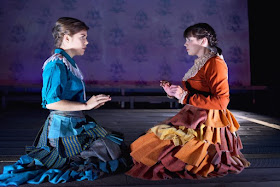 |
| Katrina Day, Hannah Vaughn Photo: Jonno Rattman |
The Incredible Fox Sisters has much in it that is funny and thought-provoking. However, it lacks a cohesive tone, ranging from ghost story to skit comedy. Also, by making it clear that the girls actually do talk to the dead, it eliminates the sort of ambiguity that deepens a story and allows an audience their own interpretations.
 |
| The Actual Fox Sisters |
The Incredible Fox Sisters is framed by monologues by Dr. Amphitheater. At the start, he says,
"If you see something that terrifies youAt the end, he says,
Run for your life
Or wait there, feet planted
And let it haunt you
Vertebrae by vertebrae."
We feel more aliveYet the show plays about 90% silly and 10% genuine (with the later often buried in the noise of the former). For example, the penultimate scene, sandwiched between an ostensibly sad and mystical reunion and Dr. Amphitheater's final speech, gives us broad comedy relying on Fargo-esque accents and recycled jokes. The show gets in its own way again and again, and it is neither mysterious or spooky.
When we are scared-
When we are present in the face
Of terrible
Mystery
Part of the problem may be the direction. Mercer keeps the mood of the play at least a level too antic, undercutting the genuine feelings and ideas underneath the the fun. Another problem is that too much time is spent on the 25 or so scene changes, so that any time the show finds a rhythm, it is interrupted.
On the other hand, the cast is quite good. (They are Katrina Day, Phoebe Dunn, Stephen Elrod, Shannon Haddock, Andrew Hamling, Kate Owens, Anthony Ritosa, and Hannah Vaughn.) And the design elements are strong. The soundscape, by Beth Lake, and the video, by Katherine Freer, give hints of what the show might have been if it took itself more seriously.
Wendy Caster
(4th row, press ticket)

No comments:
Post a Comment